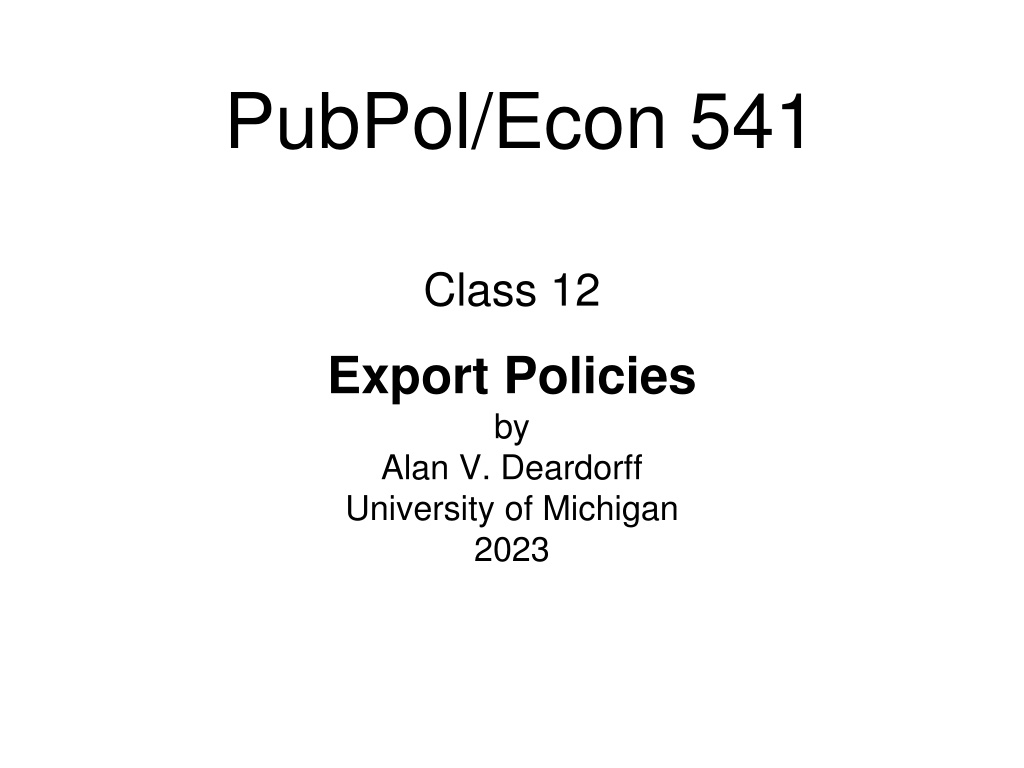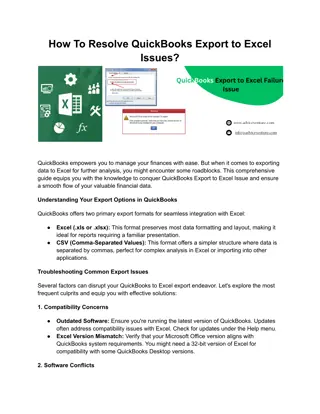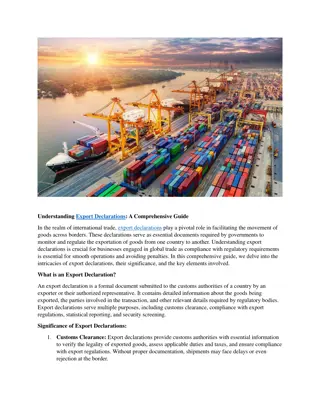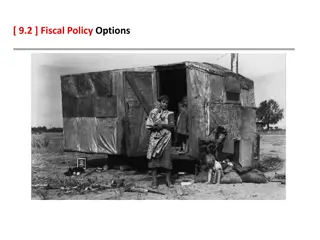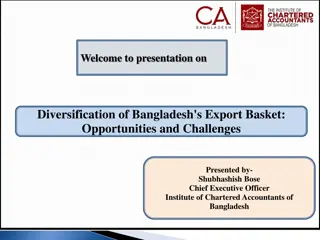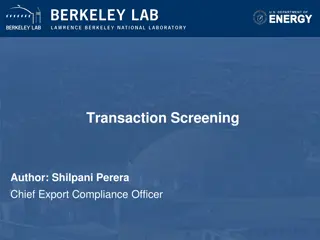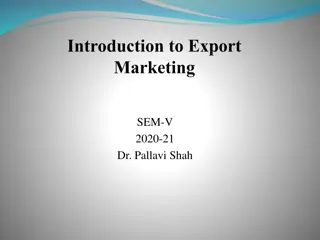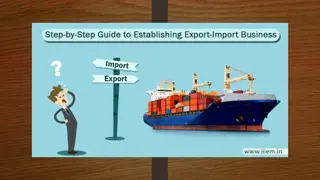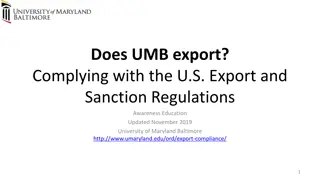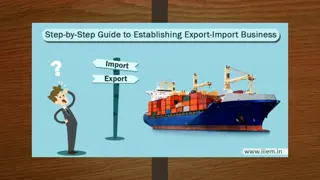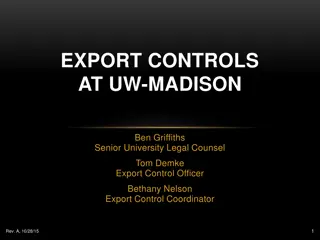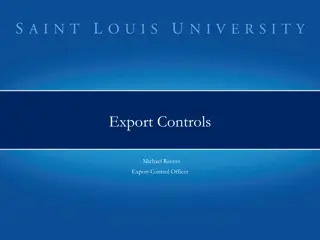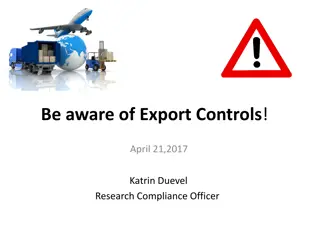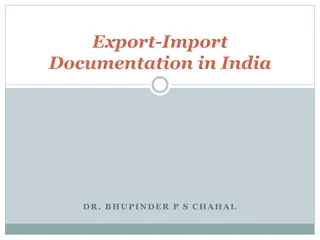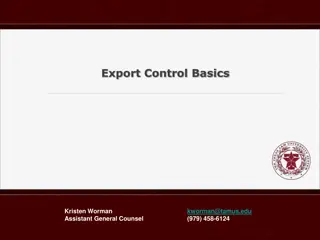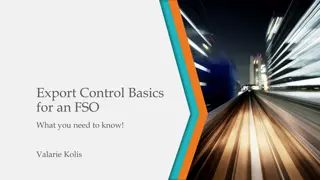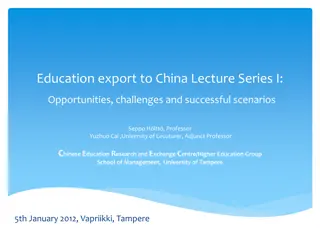Understanding Export Policies in Economics
Explore the various types and reasons behind export policies, including bans, taxes, and subsidies. Delve into the economic analysis and empirics of export restrictions and recent uses in the global trade landscape. Discover the prevalence of export taxes and their concentration on specific products across different WTO members.
Download Presentation

Please find below an Image/Link to download the presentation.
The content on the website is provided AS IS for your information and personal use only. It may not be sold, licensed, or shared on other websites without obtaining consent from the author. Download presentation by click this link. If you encounter any issues during the download, it is possible that the publisher has removed the file from their server.
E N D
Presentation Transcript
PubPol/Econ 541 Class 12 Export Policies by Alan V. Deardorff University of Michigan 2023
Announcements Monday, 10/16: (Fall Break) Class not required or expected, but I ll be here for Q&A and discussion Quizzes Quiz 6 on NTBs & Export Policies this Friday Oct 13 No quiz Oct 20 Quiz 7 Oct 27 Class 12: Export Policies 2
For next Monday If you ve time and interest, Optional: read and view: Scott and Trade Talk on trade and women Economist on Making trade greener: When environmental protection turns into trade protection Telling on developing countries Economist on The urge to protect: How trade restrictions are being used as a tool to protect human rights Swanson on black and disadvantaged workers Class 11: Non-tariff Barriers 3
Outline Export policies How common are they Economic analysis Empirics of export restrictions Recent uses Class 12: Export Policies 4
Export policies Types of export policies Bans Taxes Subsidies Class 12: Export Policies 5
Export policies Reasons for export policies Bans To keep products away from other countries To lower prices to home consumers Taxes To raise revenue To lower prices to home consumers Subsidies (see later, Dec 4. Not GATT-legal) To support domestic producers Class 12: Export Policies 6
Outline Export policies How common are they Economic analysis Empirics of export restrictions Recent uses Class 12: Export Policies 7
How common are export taxes See Laborde et al. Note first why they ve been neglected: Countries usually want to export more, not less Export taxes are used by about 1/3 of WTO members Average was 0.48% per cent in 2007 This is less than half a percent. This must be an average of ones that are zero. Class 12: Export Policies 8
How common are export taxes Export taxes are concentrated on Raw agricultural products Minerals Processed oilseeds Aluminum and iron Timber. Energy products (esp. Russia natural gas) Class 12: Export Policies 9
Note bias: High taxes cause less trade and lower weight. Class 12: Export Policies 10
Pause for Discussion Class 12: Export Policies 12
Questions on Laborde et al. In 2006, what sector had the most export taxes? What are some of the motives for export taxes mentioned? Class 12: Export Policies 13
Outline Export policies How common are they Economic analysis Empirics of export restrictions Recent uses Class 12: Export Policies 14
Economic Analysis Use the same tools and assumptions as for tariffs Export tax causes domestic price to be below the world price by the amount of the tax (if country still exports) Why? If suppliers continue to sell both at home and for export, They must get the same at home as for export And that is the world price minus the tax Class 12: Export Policies 15
Small country export tax Effects of an export tax, starting from free trade Price falls Quantity demanded rises Quantity supplied falls Quantity of exports falls Tax revenue rises from zero P D S P0=PW t P1=PW t Paut X0 D0 S0 Q D1 S1 X1 Specific Export Tax t Class 12: Export Policies 16
Small country export tax Welfare effects of an export tax, starting from free trade Suppliers lose Demanders gain +(a+b) Government gains +d Country loses (c+e) P D S (a+b+c+d+e) P0=PW c e t a d f b P1=PW t Paut X0 D0 S0 Q D1 S1 X1 Specific Export Tax t Class 12: Export Policies 17
Small country export tax Welfare effects of an export tax, starting from free trade Suppliers lose Demanders gain (a+b) Government gains +d Country loses (c+e) P D S (a+b+c+d+e) P0=PW c e t a d f b P1=PW t Paut X0 D0 S0 Q D1 S1 X1 Specific Export Tax t Class 12: Export Policies 18
Large country, World Market Welfare effects of a large- country tariff, starting from free trade Home: Private sector (S&D) loses (c+d) Government gains +(a+c) Country may gain or lose: +a d Foreign Private sector (S&D) loses (a+b) World loses (b+d) World Market Home is Exporter Foreign (*) is Importer P XS P*1 a b d t c P1 MD* X1=M*1 X0=M*0 M*,X Classes 3, 4: Tariffs and Quotas
Large country, World Market Thus large country, again, will gain from export tax if a>d What is area a? The portion of the tax paid by foreign importers, who pay a higher price A transfer from foreign demanders to the home government The result, again, of improving the home country s terms of trade World Market Home is Exporter Foreign (*) is Importer P XS P*1 a b d t c P1 MD* X1=M*1 X0=M*0 M*,X Terms of Trade Relative price of exports = PX/PM Classes 3, 4: Tariffs and Quotas
Pause for Discussion Class 12: Export Policies 21
Questions (not asked about readings) Explain why an export tax pushes down the price at home. Explain why an export tax pushes up the price abroad. Who are hurt and who are helped by an export tax? Statement above said Export tax causes domestic price to be below the world price by the amount of the tax (if country still exports) What happens if exports stop? Class 12: Export Policies 22
Outline Export policies How common are they Economic analysis Empirics of export restrictions Recent uses Class 12: Export Policies 23
Empirics Laborde et al. They use computer model of trade to quantify the effects of removing export taxes that existed in 2007 (CGE Model = Computable General Equilibrium Model) Class 12: Export Policies 24
Empirics Findings: Export tax removal causes an overall gain of 0.24 per cent in world real income +1.6 per cent in oil-exporting countries, +0.2 per cent in developed countries and +0.1 per cent in other developing countries. boosts world trade volumes by 2.8 per cent reduces the world price of these products. Class 12: Export Policies 25
Empirics Findings on export tax removal: The largest winner is the CIS block (whose real income increases by 3.5 per cent) Other oil exporters are negatively hit Importing countries can benefit May cause deindustrialization Despite their much smaller size, export taxes effects on real incomes are more than half those of import taxes Class 12: Export Policies 26
Empirics Beckman et al. Reports effect of export taxes in agriculture, 2006-2008 In times of high or volatile prices, they are generally applied to guarantee domestic food supply and lower domestic prices. Results from both a partial equilibrium model and a CGE model Class 12: Export Policies 28
Empirics Effects of export taxes, Beckman et al.: lower domestic prices. increased international prices if exporter is large or if many exporters tax negative impacts on welfare countries that implemented these policies tended to weather the food-price crisis the best. countries that are dependent on food imports were not as insulated Class 12: Export Policies 30
Note the zero line. This is a very odd way to present results. Class 12: Export Policies 31
Pause for Discussion Class 12: Export Policies 32
Questions on Laborde et al., Economic Effects of Export Taxes What are some of the main effects of removing export taxes? What are some of the limitations of this analysis? Class 12: Export Policies 33
Questions on Beckman et al., Export taxes on agricultural What was the main reason for export taxes examined here? Can you tell from this whether the policies have the desired effects? Does Figure 2 show poverty falling in all the countries? Class 12: Export Policies 34
Outline Export policies How common are they Economic analysis Empirics of export restrictions Recent uses Class 12: Export Policies 35
Recent Uses India: Banned all export of onions in 2020 Due to drought, then rain, and resulting onion shortage Neighboring country consumers hit hard Began restricting exports of rice in September 2022 World price had risen after Russia invaded Ukraine Purposes To lower price at home Recover part of its huge subsidies on fertilizer and power Class 12: Exrport Policies 36
Recent Uses Mozambique: Cashews Since 2001 Export tax of 18-22% on raw cashews Export tax of zero on processed cashews Purpose: to support processing industry Growers are hurt, but the processing industry has thrived But, quality of raw cashews became one of the lowest in the world Class 12: Export Policies 37
Recent Uses Bans on export of sand Several countries Indonesia in 2003, Vietnam in 2010, Cambodia in 2017, Malaysia in 1997-2015, and again in 2020. Why? Mining sand threatens natural habitats Huge amounts needed for construction and land reclamation. Many countries but especially China Singapore Class 12: Export Policies 38
Recent Uses Cocoa In summer 2019: Governments of Ghana and Ivory Coast formed a cocoa cartel that will charge an extra $400 per metric ton of the crop to give a better deal to farmers. Why might this succeed? The two produce about 65% of the world s cocoa. Smaller producers can t serve the needs of the largest brands Class 12: Export Policies 39
Recent Uses Rare earths from China In 2010, restricted exports of rare earths to Japan following a territorial dispute Announced July 3 it would impose export restrictions on gallium and It controls ~80% of world supply Crucial for many high-tech products Including American F-35 fighter jets Class 12: Export Policies 40
Recent Uses Indonesia 2020 banned exports of nickel to encourage processing of it in the country Added ban on exporting bauxite (used for aluminum) in June 2023 Next may come export bans on copper, then tin and gold. Class 12: Export Policies 41
Recent Uses Australia energy policies New policies in 2023 on exports of LNG (liquified natural gas) Price caps Export controls Countries relying on Australia LNG: Japan 42% China 34.5 % South Korea 22% Class 12: Export Policies 42
Recent Uses Multiple countries restricting exports of critical minerals New report in 2023: export restrictions have increased over the last decade more than fivefold. Top countries with new restrictions: China, India, Vietnam, Russia, Argentina and Kazakhstan. 44
Argentina: Country in which production is concentrated: Congo: Note: This is not 40%, but 40 times! China: Vietnam: Class 12: Export Policies 45
Recent Uses China Restrictions on exports of gallium and germanium, critical inputs for semiconductor manufacturing See Godek on their effectiveness Earlier 2010 limits on China s rare earth exports did less than expected [Godek was student iin this course last year, now works a Stimson Center in DC.] 46
Pause for Discussion Class 12: Export Policies 47
Questions on Economist, Full Metal Jacket Has Indonesia s ban on export of nickel ore accomplished what it intended? What is the main reason that expanding the ban to include other metals may work less well than the ban on nickel? What other reasons does the article give for this being ill-advised ? Class 12: Export Policies 48
Questions on Reed & Singh, India Restricts Rice Exports How is India restricting rice exports? How important is India in the world rice market? What role do subsidies play? A possible cartel is mentioned. What s that about? Class 12: Export Policies 49
Questions on Fildes, Australia Rattles Industry Why is Australia limiting exports of LNG? What, besides limiting exports, are they doing to reduce the price? What harm will this do, according to critics? Class 12: Export Policies 50
